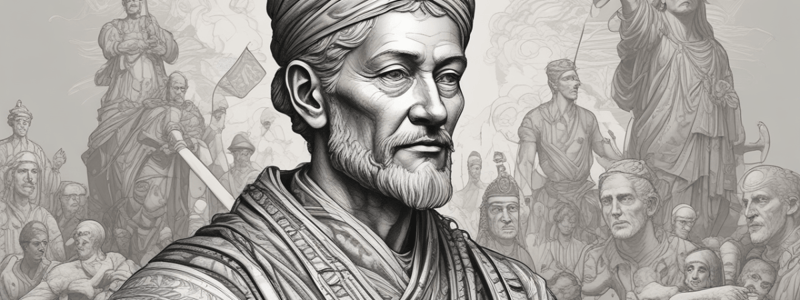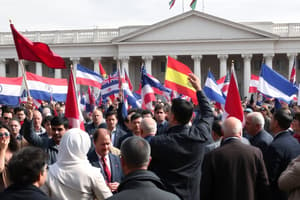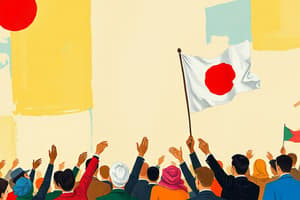Podcast
Questions and Answers
What is the primary focus of this chapter?
What is the primary focus of this chapter?
- The historical development of democratization since the late eighteenth century (correct)
- The current state of democracy in specific countries
- The introduction of the 'waves' and 'conjunctures' concepts
- The concept of reverse waves in democratization
Who is the author that is mentioned in the text as distinguishing three major 'waves'?
Who is the author that is mentioned in the text as distinguishing three major 'waves'?
- Dirk Berg-Schlosser
- Samuel Huntington (correct)
- Another prominent democratization researcher
- A historian of democracy
What is the primary timeframe of the Second 'Long Wave'?
What is the primary timeframe of the Second 'Long Wave'?
- 1918/19
- 1945–88 (correct)
- 1776–1914
- 1989/90
What is the term used to describe a period of significant democratic progress?
What is the term used to describe a period of significant democratic progress?
What is the title of the first 'Long Wave'?
What is the title of the first 'Long Wave'?
What is the primary purpose of highlighting long-term and short-term factors in democratization?
What is the primary purpose of highlighting long-term and short-term factors in democratization?
What is the name of the model that links different levels of analysis, as mentioned in the text?
What is the name of the model that links different levels of analysis, as mentioned in the text?
Who challenges the periodization of democratization and suggests a fourth wave starting in 1989/90?
Who challenges the periodization of democratization and suggests a fourth wave starting in 1989/90?
What is the term used to describe slower, long-term developments in democratization?
What is the term used to describe slower, long-term developments in democratization?
What is the term used to describe critical moments in which a series of related events can happen in a relatively short period of time?
What is the term used to describe critical moments in which a series of related events can happen in a relatively short period of time?
What is the term used to describe the 'conditions of occurrence' that shape political life?
What is the term used to describe the 'conditions of occurrence' that shape political life?
What is the level of analysis at which social movements, interest groups, and political parties operate?
What is the level of analysis at which social movements, interest groups, and political parties operate?
What type of political system is the explanandum in the model of sociological explanation?
What type of political system is the explanandum in the model of sociological explanation?
Who is the author of the concept of 'pulses of isomorphic change'?
Who is the author of the concept of 'pulses of isomorphic change'?
What is the name of the author who wrote about the 'opportunity set' in the context of democratization?
What is the name of the author who wrote about the 'opportunity set' in the context of democratization?
What is the term used to describe the subjective dimension of politics?
What is the term used to describe the subjective dimension of politics?
What is the main limitation of the numbers presented in the text?
What is the main limitation of the numbers presented in the text?
What was the outcome of the series of military coups in Latin America after 1964?
What was the outcome of the series of military coups in Latin America after 1964?
Where were the early fledgling democracies largely confined to?
Where were the early fledgling democracies largely confined to?
What marked the end of the First Long Wave?
What marked the end of the First Long Wave?
What followed the First Long Wave?
What followed the First Long Wave?
What event brought about a second long wave of democratization?
What event brought about a second long wave of democratization?
What happened in the 1960s in Latin America?
What happened in the 1960s in Latin America?
How has the Third Wave of democratization been characterized?
How has the Third Wave of democratization been characterized?
What has been the outcome of the ‘colour revolutions’ and the ‘Arab Spring’?
What has been the outcome of the ‘colour revolutions’ and the ‘Arab Spring’?
What has been the trend of autocracies in recent years?
What has been the trend of autocracies in recent years?
What is the primary source of data used to compile the Polity IV scores?
What is the primary source of data used to compile the Polity IV scores?
What is the main limitation of the Polity IV scores in terms of assessing democratization?
What is the main limitation of the Polity IV scores in terms of assessing democratization?
What is the term used to describe the combination of democratization and autocratization trends?
What is the term used to describe the combination of democratization and autocratization trends?
How many major positive conjunctures of democratization are identified in the graph?
How many major positive conjunctures of democratization are identified in the graph?
What is the primary factor that restricted the dimension of inclusion in the 19th century?
What is the primary factor that restricted the dimension of inclusion in the 19th century?
Which country was the first to introduce full women's voting rights?
Which country was the first to introduce full women's voting rights?
What is the term used to describe open pluralist competition between candidates and parties?
What is the term used to describe open pluralist competition between candidates and parties?
What is the primary focus of the labor and similar movements in the 19th century?
What is the primary focus of the labor and similar movements in the 19th century?
What is the main trend observed in the democratization process over time?
What is the main trend observed in the democratization process over time?
What is the purpose of the concluding section in the chapter?
What is the purpose of the concluding section in the chapter?
What was the primary basis of legitimacy for larger political entities in the past?
What was the primary basis of legitimacy for larger political entities in the past?
According to Robert Dahl, what marked the beginning of the first 'long wave' of democratization?
According to Robert Dahl, what marked the beginning of the first 'long wave' of democratization?
What was a key feature of the republican tradition that emerged during the 'second transformation'?
What was a key feature of the republican tradition that emerged during the 'second transformation'?
Which of the following was a major factor contributing to the democratization process?
Which of the following was a major factor contributing to the democratization process?
What was the primary goal of the labour movement and socialist parties?
What was the primary goal of the labour movement and socialist parties?
What was the outcome of the revolutions of 1848?
What was the outcome of the revolutions of 1848?
What was the impact of the urbanization process on democratization?
What was the impact of the urbanization process on democratization?
What was a consequence of World War I?
What was a consequence of World War I?
What was the role of the urban bourgeoisie and middle classes in the democratization process?
What was the role of the urban bourgeoisie and middle classes in the democratization process?
What was the consequence of the Enlightenment on politics?
What was the consequence of the Enlightenment on politics?
What was the outcome of the authoritarian regimes in Latin America?
What was the outcome of the authoritarian regimes in Latin America?
What was the result of the decolonization and Cold War period?
What was the result of the decolonization and Cold War period?
What happened in Southern Europe during the 1970s?
What happened in Southern Europe during the 1970s?
What was the outcome of the regime in the Philippines after the fall of Marcos?
What was the outcome of the regime in the Philippines after the fall of Marcos?
What was the outcome of the military regimes in South Korea?
What was the outcome of the military regimes in South Korea?
What is shown in Figure 5.4?
What is shown in Figure 5.4?
What was the outcome of the new democratic systems in countries like Poland, Portugal, Spain, and Romania?
What was the outcome of the new democratic systems in countries like Poland, Portugal, Spain, and Romania?
What was the impact of the great world economic crisis after 1929 on democratization?
What was the impact of the great world economic crisis after 1929 on democratization?
What was the outcome of the presidential actions in Finland and Estonia during the economic crisis?
What was the outcome of the presidential actions in Finland and Estonia during the economic crisis?
What was the result of the attack on Poland in 1939 and Pearl Harbor in 1941?
What was the result of the attack on Poland in 1939 and Pearl Harbor in 1941?
What was the outcome of the victorious World War II allies in the defeated countries occupied by them?
What was the outcome of the victorious World War II allies in the defeated countries occupied by them?
What was the result of the war in Austria and Germany?
What was the result of the war in Austria and Germany?
What was the outcome of the mobilization during the war in pre-existing incomplete democracies?
What was the outcome of the mobilization during the war in pre-existing incomplete democracies?
What was the primary purpose of the League of Nations?
What was the primary purpose of the League of Nations?
What was the outcome of the renewed attempts of democratization in Austria, Germany, Italy, and Japan?
What was the outcome of the renewed attempts of democratization in Austria, Germany, Italy, and Japan?
Which country remained independent from European colonial powers the longest?
Which country remained independent from European colonial powers the longest?
What type of government did most newly independent African states adopt initially?
What type of government did most newly independent African states adopt initially?
What was the outcome of the 'people's democracies' emerging in Central and Eastern Europe?
What was the outcome of the 'people's democracies' emerging in Central and Eastern Europe?
What international organization was founded in 1945 to promote collective security?
What international organization was founded in 1945 to promote collective security?
Which country remained a special case in Sub-Saharan Africa during the wave of independence?
Which country remained a special case in Sub-Saharan Africa during the wave of independence?
What type of government did India adopt after gaining independence?
What type of government did India adopt after gaining independence?
Which country was the last to gain independence from European colonial powers?
Which country was the last to gain independence from European colonial powers?
What was the outcome of French efforts to keep their territories by military force?
What was the outcome of French efforts to keep their territories by military force?
Which country consistently maintained its democratic constitution in Latin America?
Which country consistently maintained its democratic constitution in Latin America?
What was the outcome of the first multi-party elections in Turkey after World War II?
What was the outcome of the first multi-party elections in Turkey after World War II?
Which region remained untouched by democratic movements after World War II?
Which region remained untouched by democratic movements after World War II?
What are the three main ingredients that have contributed to democratization?
What are the three main ingredients that have contributed to democratization?
What event led to the first major 'conjuncture' of political forces, actors, and events?
What event led to the first major 'conjuncture' of political forces, actors, and events?
Which of the following was a consequence of the peace treaties at the end of World War I?
Which of the following was a consequence of the peace treaties at the end of World War I?
What is a necessary condition for democracy to exist, according to Rokkan?
What is a necessary condition for democracy to exist, according to Rokkan?
What is a key factor in determining whether a democracy is consolidated or not?
What is a key factor in determining whether a democracy is consolidated or not?
What is the primary function of the League of Nations, as proposed by President Woodrow Wilson?
What is the primary function of the League of Nations, as proposed by President Woodrow Wilson?
Which of the following is NOT a factor favourable for democracy, according to empirical democratic theory?
Which of the following is NOT a factor favourable for democracy, according to empirical democratic theory?
What is the term used to describe the emotions and demands of countries that have suffered territorial losses, such as Germany or Hungary?
What is the term used to describe the emotions and demands of countries that have suffered territorial losses, such as Germany or Hungary?
Which of the following is a key component of a democratic political culture, according to Almond and Verba?
Which of the following is a key component of a democratic political culture, according to Almond and Verba?
What is the primary function of civil control of the military and other armed forces, according to democratic theory?
What is the primary function of civil control of the military and other armed forces, according to democratic theory?




